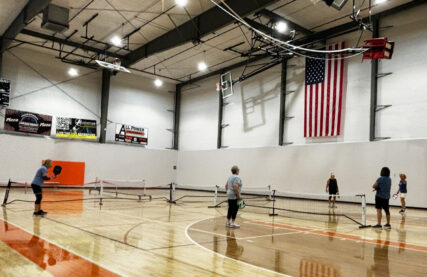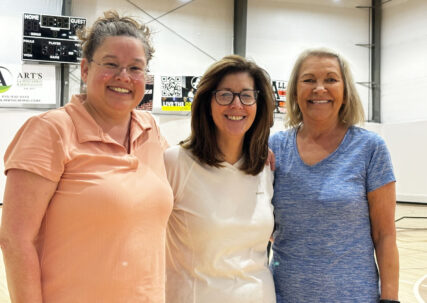
Bourbonnais, Ill. (RNS) — The gym at the Adventure Commons was filled with sounds of pickleball — squeaking sneakers, the thwack of a paddle hitting a ball and cheers from players after a good shot.
A dozen players filled three courts at the athletic center, run by the Adventure Christian Church, located just off exit 315 from Interstate 57 in south suburban Chicago.
Among those playing pickleball on Wednesday morning (May 14) was Kathy Henricks, a retired real estate agent and member of Adventure Church. She’s been playing the game with friends for about four years — and is largely responsible for the church having pickleball.
“I said, ‘How come we don’t have pickleball?’” she told RNS, during a break between games. “And a little while later we had nets and were ready to roll.”
That same question is being asked at churches all over the country — from downtown megachurches to smalltown congregations — that are hoping to tap into the power of pickleball to build community and bring a little joy to their neighbors. About 20 million Americans played pickleball in 2024, according to data from the Sports and Fitness Industry Association, and that number continues to grow.
More than a few play at churches.
Todd Katter, pastor of Willow Creek Community Church’s Huntley campus in the Chicago suburbs, said as many as 150 people have taken part in pickleball events sponsored by the church campus in local venues and in the church parking lot.
“Which was a bad idea,” said Katter, as it turned out the parking lot sloped downward. He called pickleball a “playground” for adults and a new third space where people hang out and make friends — and it appeals to folks from 17 to 70.
“There was an era where people went to Starbucks to hang out, he said. “Now, people drive through and grab a Starbucks and go play pickleball.”
Katter, who picked up the game a few years ago, said pickleball is a great outreach for churches. It’s easy to play and is widely popular. And it doesn’t take long for people to get hooked, because the skill level-to-enjoyment curve isn’t very steep.
“Even if you don’t have a lot of skill, you can still have a lot of fun,” said Katter.
Jason Young, the care and ministry pastor at Hope Community Church in Glenview, Illinois, said sports like pickleball can have both social and spiritual benefits. Young said he started going to church in his 20s, after his brother invited him to join a church volleyball team. At the time, he’d had no interest in religion, but he loved to play volleyball, so he said yes. Over time, he said, being around folks on the team rubbed off on him and he eventually started going to church.
Sports and friendship, he said, opened the door for him to think about faith. “What I appreciated about it was nobody was kind of putting me in the hot seat,” he said.
Hope started offering pickleball a few years ago, when the church, which started during the COVID-19 pandemic, was meeting in a park district building that had a gym. One day, Young said, a church member approached the pastors with the idea of offering a free pickleball clinic. About 40 folks showed up to that first clinic, so when Hope moved to a new building, leaders decided to offer pickleball a few days a week.

Players join together on one of the pickleball courts set up at Adventure Commons. RNS photo by Bob Smietana
Kay Seamayer, 85, said she was thrilled when First Baptist Church in Dallas decided to start offering pickleball. Seamayer, a lifelong athlete, had been playing for more than a decade and was a longtime advocate for the game.
Anyone can play it, she said. And it’s a great way to make friends.
But playing at church did come with a challenge. The game draws people of all skill levels, she said, and that meant toning her competitive side down a bit. Which took some prayer, she said, and a message from God.
“You just don’t have to be competitive in everything you do,” said Seamayer, who still plays competitive three-on-three basketball. “So, settle down and help those people who want to play and just play for fun.”
First Baptist runs pickleball as part of the church’s overall sports ministry, with leagues in the fall and winter, said Brent McFadden, minister of sports and outreach. They also offer pickleball during open gym times — the church has a pair of courts marked out for pickleball. The sessions start with a short prayer and then a devotional.
Many of the folks who take part in pickleball or other sports aren’t members. But that’s OK, said McFadden. The idea is to offer an easy entry point to the church for folks who might be skeptical of coming to a service.
The Rev. Michael Graham, of Gilford Community Church, a progressive congregation in New Hampshire, hopes to give pickleball a try at some point. Graham got a pickleball racket for his birthday, but knee surgery delayed his debut on the court.
Graham sits on the board of the Gilford Youth Center, a nonprofit that operates out of the gym the church built that offers sport programs to the community. He was skeptical at first when folks from the community asked about playing pickleball at the center.
Now the center offers pickleball three days a week.

Pickleballers Ruth Ilg , Terrie Golwitzer, and Kathy Henricks stand for a portrait during a game day at Adventure Commons. RNS photo by Bob Smietana
“Over probably the last four or five years, pickleball has become so important that now we have three courts,” he said.
The Armenian Church of Our Saviour, an Orthodox church in Worcester, Massachusetts, has offered pickleball in the church’s auditorium over the past two winters, said Bryan Davis, a longtime church member.
Davis, a 72-year-old retired teacher, said a friend from the church had introduced him to pickleball a few years ago — and he played mostly outside. Then his friend came up with the idea of playing in the auditorium, which doubles as a gym and event space.
“He kept on saying, you know, I think we could fit some pickleball courts in the auditorium,” said Davis. “We went up and measured, and sure enough, we could fit two in there.”
Because the space is used for all kinds of events, the courts could not be permanent. Instead, Davis said, church members lay out the courts using a special tape, which takes about a half an hour to lay down — and just a few minutes to clean up afterwards.
About a dozen folks play at the church, paying $5 each — with the funds going to pay for equipment.
“We gave a little money back to the church, too,” he said. “The priest came and played. He loved it. It was just really a lot of fun.”
Terrie Golwitzer started playing pickleball at Adventure two years ago after Henricks invited her to give it a try. She watched a few videos online to get some tips, then showed up to play on a Monday. After about 10 minutes, she was hooked.
Now she plays three days a week and is in a group chat with friends she’s made there. They often hang out together when they are not playing. And she said pickleball is one place where folks don’t argue about politics, which is a relief, and the game has both social and health benefits.
“Pickleball is about people,” she said.
